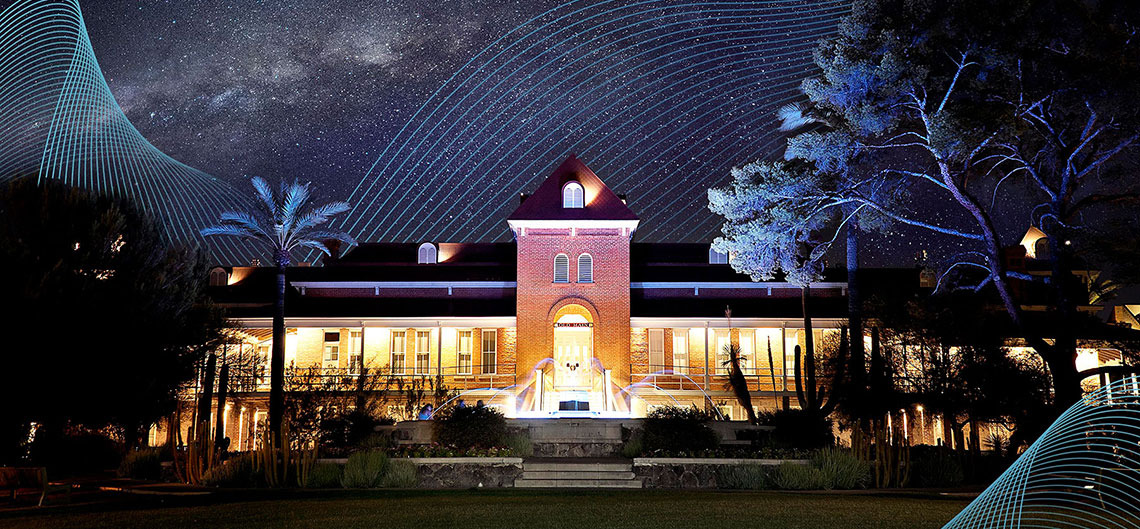
Hatched in 2015 out of a merger of two existing units (the School of Information Resources and Library Science and the School of Information Science, Technology and Arts), the School of Information at the University of Arizona became its own college on July 1, 2023.
The iSchool began as an accredited master’s degree in library science that is now more than 50 years old. Today, we manage four graduate degrees and five undergraduate degrees, plus an additional set of certificates and minors.
Initially, to grow the iSchool, University of Arizona administration recommended the school be nested within a college and cared for by an established dean as it developed. The College of Social and Behavioral Sciences managed the iSchool through its first eight years of development. The proposers intended that the iSchool would become an independent college when it achieved sufficient scale.
View the School of Information Interactive Timeline
Information Science, the iSchools Consortium and Launching the UArizona iSchool
Information science began in the late 19th and beginning of the 20th century with the development of indexing, controlled vocabularies and distribution networks for journals and other printed matter. It included archivists, librarians, museum curators, documentalists and kindred disciplines. As paper-based societies evolved to digital format, so did the nature of librarianship and information science.
iSchool is short for Information School. Beginning in the 1960s, library and information science degrees began to morph to cover all aspects of information. In the 1970s, computer science degree programs began mostly in departments of engineering or mathematics. In the library schools, information science research surpassed library research in volume with a much larger focus than that of computer science. In 1988, the University of Pittsburgh, Syracuse University and Drexel University formed the “Gang of Three” to advance administrative coordination of information science research and education.
Bryan Heidorn, founder of the UArizona iSchool and current professor and iSchool associate dean for research, joined the PhD program at the University of Pittsburgh shortly after. He received his PhD from the University of Pittsburgh iSchool in Information Science with a dissertation focused on cognitive natural language processing, the kind of dissertation that can only happen at an iSchool. While he was serving as a faculty member there, University of Illinois became a member of the Gang of Ten R1 universities conducting research and offering education in information science. This group grew to 19 universities and became the iCaucus in 2005. 74% of those schools had degree programs accredited by the American Library Association, as well as other information degrees. Almost all of those units had their own deans, as the UArizona iSchool does since it became a college in 2023.
By 2008 all U.S. News top-ranked library graduate degree programs were in iSchools. When Dr. Heidorn interviewed for the directorship of the School of Information Resources and Library Science (known then as SIRLS), he proposed that it become an American Library Association-accredited iSchool and join the iSchools consortium. Paul Cohen, previously the chair of UArizona's Department of Computer Science, split from that department to form the School of Information Science, Technology and Arts (ISTA) to take advantage of some of the intellectual space not being addressed elsewhere in Arizona. Dr. Cohen and Dr. Heidorn met many times over the coming years. In 2014, Dr. Heidorn invited the deans from the then-three top iSchools (University of Illinois, University of Washington and Syracuse University) to come to campus to help us communicate what it means to have an iSchool.
In 2015, ISTA and SIRLS merged to become the School of Information. At that time we tried to become a college but we were not yet large enough. Instead, the dean of the College of Social and Behavioral Science, JP Jones, agreed to help shepherd the new unit through its early years. At the same time the new school had generated enough research productivity to be accepted into the iSchools consortium. Since 2015, the School of Information has grown greatly in its research capacity and now has nine degree programs and 1,500 students.
Catherine Brooks served as the School of Information director from January 2019 to July 2023 before being named interim dean when the new college launched in July 2023. Dean Brooks is also the founding director of the Center for Digital Society and Data Studies, which is now directed by Dr. Heidorn.
Today, the iSchools consortium represents an international organization of over 120 universities. A common interest in all aspects of research and teaching about information unites them. Many include departments of computer science, journalism, business schools and others. Our own iSchool has shared classes and research projects with computer science, linguistics, journalism, communication, medieval studies, nursing, medicine, astronomy and others.
The scope of iSchools is deliberately broad and methodologically agnostic, with a strong reliance on the social and behavioral sciences, as well as computing, artificial intelligence and linguistics. iSchools topics include data science, human-computer interaction, information organization and access, bibliometrics and information integrity. Information scientists share a common perspective on the importance of how intelligent creatures and machines understand the universe.
The explosion of information—driven by computation, telecommunications and humanity’s pursuit of ever more knowledge—is happening in all aspects of society. Arizona's iSchool prepares graduates at the forefront of this latest information revolution to meet the challenges and opportunities with both knowledge and reason but also heart, soul and a moral sense.


